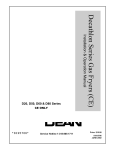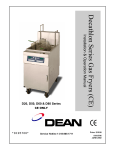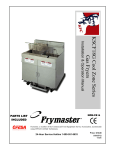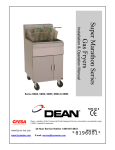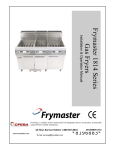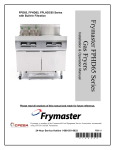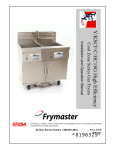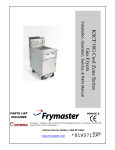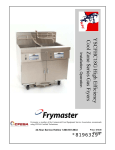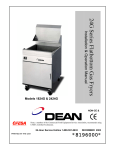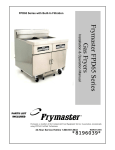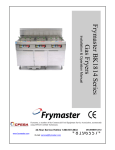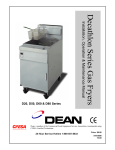Download Dito Dean D20 User's Manual
Transcript
Decathlon Series Gas Fryers (NonCE) Installation & Operation Manual D20, D50, D60 & D80 Series Dean, a member of the Commercial Food Equipment Service Association, recommends using CFESA Certified Technicians. 24-Hour Service Hotline 1-800-551-8633 AUGUST 2003 *8195698* DANGER Adequate means must be provided to limit the movement of this appliance without depending upon the gas line connection. Single fryers equipped with legs must be stabilized by installing anchor straps. All fryers equipped with casters must be stabilized by installing restraining chains. If a flexible gas line is used, an additional restraining cable must be connected at all times when the fryer is in use. DANGER The front ledge of the fryer is not a step. Do not stand on the fryer. Serious injury can result from slips or contact with the hot oil. DANGER Do not store or use gasoline or other flammable vapors and liquids in the vicinity of this or any other appliance. DANGER Instructions to be followed in the event the operator smells gas or otherwise detects a gas leak must be posted in a prominent location. This information can be obtained from the local gas company or gas supplier. DANGER The crumb tray in fryers equipped with a filter system must be emptied into a fireproof container at the end of frying operations each day. Some food particles can spontaneously combust if left soaking in certain shortening material. Additional information can be obtained in the filtration manual included with the system. WARNING No structural material on the fryer should be altered or removed to accommodate placement of the fryer under a hood. Questions? Call the Frymaster/Dean Service Hotline at 1-800-551-8633. WARNING Do not bang fry baskets or other utensils on the fryer’s joiner strip. The strip is present to seal the joint between the frypot. Banging fry baskets on the strip to dislodge shortening will distort the strip, adversely affecting its fit. It is designed for a tight fit and should only be removed for cleaning. NOTICE IF, DURING THE WARRANTY PERIOD, THE CUSTOMER USES A PART FOR THIS ENODIS EQUIPMENT OTHER THAN AN UNMODIFIED NEW OR RECYCLED PART PURCHASED DIRECTLY FROM FRYMASTER/DEAN, OR ANY OF ITS AUTHORIZED SERVICE CENTERS, AND/OR THE PART BEING USED IS MODIFIED FROM ITS ORIGINAL CONFIGURATION, THIS WARRANTY WILL BE VOID. FURTHER, FRYMASTER/DEAN AND ITS AFFILIATES WILL NOT BE LIABLE FOR ANY CLAIMS, DAMAGES OR EXPENSES INCURRED BY THE CUSTOMER WHICH ARISE DIRECTLY OR INDIRECTLY, IN WHOLE OR IN PART, DUE TO THE INSTALLATION OF ANY MODIFIED PART AND/OR PART RECEIVED FROM AN UNAUTHORIZED SERVICE CENTER. Decathlon Series Gas Fryers Installation & Operation Manual TABLE OF CONTENTS Page # 1. INTRODUCTION 1-1 1.1 After Purchase 1-1 1.2 Ordering Parts 1-1 1.3 Service Information 1-1 1.4 Computer Information 1-1 1.5 Safety Information 1-2 1.6 Service Personnel 1-3 2. IMPORTANT INFORMATION 2-1 2.1 Receiving and Unpacking Equipment 2-1 2.2 General 2-1 2.3 Principles of Operation 2-2 2.4 Rating Plate 2-3 2.5 Pre-Installation 2-3 2.6 Air Supply and Ventilation 2-4 2.7 Equipment Installed at High Altitudes 2-5 3. INSTALLATION 3-1 3.1 Installing the Fryer 3-1 3.2 Leveling the Fryer (Fryers equipped with legs only) 3-1 3.3 Installing Casters and Legs 3-2 3.4 Gas Connections 3-3 3.5 Adjustments/Adaptation to Different Gases 3-6 3.6 Electrical Connections 3-8 4. FRYER OPERATIONS 4-1 4.1 Initial Start-up 4-1 4.2 Boil-Out Procedure 4-3 4.3 Final Preparation 4-5 Decathlon Series Gas Fryers Installation & Operation Manual TABLE OF CONTENTS (CONT.) Page # 5. CONTROLLER OPERATING INSTRUCTIONS 5-1 5.1 Operating Instructions: Electronic Thermostat Controller 5-1 5.2 Electronic Thermostat Controller/Computer with Back-Up Thermostat 5-2 6. PREVENTATIVE MAINTENANCE 6-1 6.1 General 6-1 7. TROUBLESHOOTING 7-1 7.1 General 7-1 7.2 Pilot Burner Malfunction 7-1 7.3 Main Burner Malfunctions 7-2 7.4 Electronic Thermostat Calibration 7-3 FINDING YOUR WAY AROUND THE DEAN DECATHLON Basket Hanger Flue Cap Frypot Top Cap Electronic Operating Thermostat Burners 1.5” Round Drains Drain Valve Handle (Red) Oil Return Handle (Yellow) Drain Flush Handle (Blue) Filter Unit Drain Tubes Drain Tubes 3” Round Drains (SCFD models) DECATHLON SERIES GAS FRYERS (NON-CE) CHAPTER 1: INTRODUCTION 1.1 After Purchase In order to improve service, have the following chart filled in by the Dean Authorized Service Technician who installed this equipment. Authorized Service Technician/FASC Address Telephone/Fax Model Number Serial Number Gas Type 1.2 Ordering Parts Customers may order parts directly from their local factory authorized service center. For this address and phone number, contact your factory authorized service center or call the Dean Service Hotline phone number, 1-800-551-8633. To speed up your order, provide the model number, serial number, gas type, part needed, item part number (if known), and quantity needed. 1.3 Service Information Call the Dean Service Hotline, 1-800-551-8633, for the location of your nearest factory authorized service center. To assist you more efficiently, always provide the service technician with the model number, gas type, serial number, and the nature of the problem. 1.4 Computer Information This equipment has been tested and found to comply with the limits for a Class A digital device, pursuant to Part 15 of the FCC rules. While this device is a verified Class A device, it has been shown to meet the Class B limits. These limits are designed to provide reasonable protection against harmful interference when the equipment is operated in a commercial environment. This equipment generates, uses and can radiate radio frequency energy and, if not installed and used in accordance with the instruction manual, may cause harmful interference to radio communications. Operation of the equipment in a residential area is likely to cause harmful interference in which case the user will be required to correct the interference at his own expense. 1-1 DECATHLON SERIES GAS FRYERS (NON-CE) CHAPTER 1: INTRODUCTION 1.4 Computer Information (cont.) The user is cautioned that any changes or modifications not expressly approved by the party responsible for compliance could void the user's authority to operate the equipment. If necessary, the user should consult the dealer or an experienced radio and television technician for additional suggestions. The user may find the following booklet prepared by the Federal Communications Commission helpful: "How to Identify and Resolve Radio-TV Interference Problems". This booklet is available from the U.S. Government Printing Office, Washington, DC 20402, Stock No. 004-000-00345-4. 1.5 Safety Information Before attempting to operate your unit, read the instructions in this manual thoroughly. Throughout this manual, you will find notations enclosed in double-bordered boxes similar to the ones below. CAUTION CAUTION boxes contain information about actions or conditions that may cause or result in a malfunction of your system. WARNING WARNING boxes contain information about actions or conditions that may cause or result in damage to your system, and which may cause your system to malfunction. DANGER DANGER boxes contain information about actions or conditions that may cause or result in injury to personnel, and which may cause damage to your system and/or cause your system to malfunction. 1-2 DECATHLON SERIES GAS FRYERS (NON-CE) CHAPTER 1: INTRODUCTION 1.6 Service Personnel 1.6.1 Definitions A. Qualified and/or Authorized Operating Personnel 1. Qualified/authorized operating personnel are those who have carefully read the information in this manual and have familiarized themselves with the equipment functions, or have had previous experience with the operation of equipment covered in this manual. B. Qualified Installation Personnel 1. Qualified installation personnel are individuals, firms, corporations, and/or companies, which, either in person or through a representative, are engaged in and are responsible for the installation of gas-fired appliances. Qualified personnel must be experienced in such work, be familiar with all gas precautions involved, and have complied with all requirements of applicable national and local codes. C. Qualified Service Personnel 1. Qualified service personnel are those who are familiar with Dean equipment and have been authorized by Dean to perform service on Dean equipment. All authorized service personnel are required to be equipped with a complete set of service parts manuals and stock a minimum amount of parts for Dean equipment. A list of Dean Factory Authorized Service Centers (FASCs) was included with the fryer when shipped from the factory. Failure to use qualified service personnel will void the Dean warranty on your equipment. 1-3 THIS PAGE INTENTIONALLY LEFT BLANK. DECATHLON SERIES GAS FRYERS (NON-CE) CHAPTER 2: IMPORTANT INFORMATION 2.1 Receiving and Unpacking Equipment A. Check that the container is upright. Use an outward prying motion - no hammering - to remove the carton. Unpack the fryer carefully and remove all accessories from the carton. Do not discard or misplace these, as they will be needed. B. After unpacking, immediately check the equipment for visible signs of shipping damage. If damage has occurred, contact the carrier and file the appropriate freight claims. Do not contact the factory. Shipping damage responsibility is between the carrier and the dealer. If your equipment arrives damaged: 1. File claim for damages immediately, regardless of extent of damage. 2. Visible loss or damage: Be sure this is noted on the freight bill or express receipt and is signed by the person making the delivery. 3. Concealed loss or damage: If damage is unnoticed until equipment is unpacked, notify freight company or carrier immediately, and file a concealed damage claim. This should be done within 15 days of date of delivery. Be sure to retain container and all packing materials for inspection. NOTE: Dean Does Not Assume Responsibility for Damage or Loss Incurred in Transit. C. Frying systems with built-in filtration: Take off the filter support brace and remove the filter pan from the cabinet. D. Decathlon four-battery systems: Casters are pre-installed on the frying system and the carton is furnished with three unloading ramps. Remove the braces from the front casters by taking out the securing bolts. Carefully roll the unit down the ramps from the front (cooking side). E. Remove all plastic skin from sides, front, and doors of the fryer(s). Failure to do this prior to initial fryer operation will make it very difficult to remove later. 2.2 General Qualified, licensed, and/or authorized installation or service personnel only (as defined in Section 1.6) should perform the following: • Installation and service on Dean equipment. • Conversion of this appliance from one gas type to another. Failure to use qualified, licensed, and/or authorized installation or service personnel to install, convert to another gas type or otherwise service this equipment will void the Dean warranty and may result in damage to the equipment or injury to personnel. 2-1 DECATHLON SERIES GAS FRYERS (NON-CE) CHAPTER 2: IMPORTANT INFORMATION 2.2 General (cont.) Where conflicts exist between instructions and information in this manual and local code or national codes, or regulations, installation and operation shall comply with the codes or regulations in force in the country in which the equipment is installed. DANGER Building codes prohibit a fryer with its open tank of hot oil/shortening from being installed beside an open flame of any type, including those of broilers and ranges. Upon arrival, inspect the fryer carefully for visible or concealed damage. (See Receiving and Unpacking Equipment in Section 2.1.) 2-2 DECATHLON SERIES GAS FRYERS (NON-CE) CHAPTER 2: IMPORTANT INFORMATION 2.4 Rating Plate This is attached to the inside front door panel. Information provided includes the model and serial number of the fryer, BTU/hr input of the burners, outlet gas pressure in inches W.C. and whether the unit has natural or propane gas orifices. DANGER Fryers MUST be connected ONLY to the gas type identified on the attached rating plate. 2.5 Pre-Installation DANGER No structural material on the fryer should be altered or removed to accommodate placement of the fryer under a hood. Questions? Call the Dean Service Hotline at 1800-551-8633. DANGER Do not connect this appliance to the gas supply before reviewing all information in this chapter. A. General: Only licensed personnel should install any gas-fired equipment. 1. A manual gas shut-off valve must be installed in the gas supply line ahead of the fryers for safety and ease of future service. 2. Dean Decathlon Series gas fryers require 120VAC 60 cycle or 230VAC single-phase 50hertz (International/CE) electrical service and are equipped with a 16-3 SJT grounded flexible power cord for a direct connection to the power supply. Amperage draw for each unit depends on the accessories supplied with the unit/system. B. Clearances: The fryer area must be kept free and clear of all combustibles. This unit is designcertified for the following installations: 1. Commercial installation only (not for household use). 2. Non-combustible floor installation equipped with factory-supplied 6-inch (15-cm) adjustable legs or 5-inch (13-cm) casters; 3. Combustible construction with a minimum clearance of 6-inches (15-cm) side and 6-inches (15-cm) rear, and equipped with factory-supplied 6-inch (15-cm) adjustable legs or 5-inch (13-cm) casters. 2-3 DECATHLON SERIES GAS FRYERS (NON-CE) CHAPTER 2: IMPORTANT INFORMATION 2.5 Pre-Installation (cont.) C. Installation Standards 1. U.S. installations must meet: 2. Canadian installations must meet: American National Standard Institute ANSI Z83.11 American Gas Association 8501 E. Pleasant Valley Road Cleveland, OH 44131 CAN 1-B149 Installation Codes Canadian Gas Association 55 Scarsdale Road Don Mills, ONT, M3B 2R3 National Electrical Code ANSI/NFPA #70 American National Standard Institute 1430 Broadway New York, NY 10018 Canadian Electric Code c22.1, part 1 Canadian Standards Association 178 Rexdale Blvd. Rexdale, ONT, M9W 1R3 NFPA Standards #96 and #211 National Fire Protection Association 470 Atlantic Avenue Boston, MA 02110 2.6 Air Supply and Ventilation DANGER This appliance must be installed with sufficient ventilation to prevent the occurrence of unacceptable concentrations of substances harmful to the health of personnel in the room in which it is installed. Keep the area around the fryer clear to prevent obstruction of combustion and ventilation airflow as well as for service and maintenance. A. Do not connect this fryer to an exhaust duct. B. Correct installation and adjustment will ensure adequate airflow to the fryer system. C. A commercial, heavy-duty fryer must vent its combustion wastes to the outside of the building. A deep-fat fryer must be installed under a powered exhaust hood, or an exhaust fan must be provided in the wall above the unit, as exhaust gas temperatures are approximately 800-1000°F (427-538°C). Check air movement during installation. Strong exhaust fans in the exhaust hood or in the overall air conditioning system can produce slight air drafts in the room. 2-4 DECATHLON SERIES GAS FRYERS (NON-CE) CHAPTER 2: IMPORTANT INFORMATION 2.6 Air Supply and Ventilation (cont.) D. Do not place the fryer’s flue outlet directly into the plenum of the hood, as it will affect the gas combustion of the fryer. E. Never use the interior of the fryer cabinet for storage or store items on shelving over or behind the fryer. Exhaust temperatures can exceed 800°F (427°C) and may damage or melt items stored in or near the fryer. F. Adequate distance must be maintained from the flue outlet of the fryer(s) to the lower edge of the filter bank. Per NFPA Standards No. 96, a minimum of 18-inches (45-cm) should be maintained between the flue(s) and the lower edge of the exhaust hood filter. G. Filters and drip troughs should be part of any industrial hood, but consult local codes before constructing and installing any hood. The duct system, the exhaust hood and the filter bank must be cleaned on a regular basis and kept free of grease. 2.7 Equipment Installed at High Altitudes A. The fryer input rating (BTU/hr) is for elevations up to 2,000 feet (610-m). For elevations above 2,000 feet (610-m), the rating should be reduced four percent for each additional 1,000 feet (305-m) above sea level. B. The correct orifices are installed at the factory if operating altitude is known at time of the customer’s order. 2-5 THIS PAGE INTENTIONALLY LEFT BLANK. DECATHLON SERIES GAS FRYERS (NON-CE) CHAPTER 3: INSTALLATION 3.1 Installing the Fryer A. Initial Installation: If the fryer is installed with legs, do not push the fryer to adjust its position. Use a pallet or lift jack to lift the fryer slightly, then place the fryer where it is to be installed. B. Relocating the fryer: Remove all weight from each leg before moving a fryer with legs installed. Do not slide the fryer on the legs. C. If a leg becomes damaged, contact your service agent for immediate repair/replacement. 3.2 Leveling the Fryer (Fryers equipped with legs only) A. All Installations: If the floor is uneven or has a definite slope, place the fryer on a level platform. B. Place a spirit level across the top of the fryer and level the unit both front-to-back and sideto-side. If it is not level, the unit may not function efficiently, the oil may not drain properly for filtering and in a line-up it may not match adjacent units. C. Adjust to the high corner and measure with the spirit level. If floor is uneven, level the unit with the screw adjustments on each leg (ensure minimum clearances as discussed in Chapter 2 are maintained during the leveling procedure). D. Re-leveling: If the fryer is moved, re-level the fryer following the above instructions. E. The install must be reviewed at the time of installation to ensure it meets the intent of these instructions. CAUTION Fryers must be at room temperature, empty of oil, and if fitted with legs, lifted during movement to avoid damage and possible bodily injury. Hot shortening can cause severe burns. Avoid contact. Under all circ must be removed from the fryer before attempting to move it to avoid oil spills, and the falls and severe burns that could occur. This fryer may tip and cause personal injury if not secured in a stationary position. 3-1 DECATHLON SERIES GAS FRYERS (NON-CE) CHAPTER 3: INSTALLATION 3.3 Installing Casters and Legs A. Install casters and/or legs near where the fryer is to be used, as neither is secure for long transit. Decathlon Series gas fryers cannot be curb mounted and must be equipped with either legs or casters provided. B. After unpacking, use a pallet or lift jack to raise the unit before installing the casters. C. Align the caster or leg base holes with the leg support assembly and insert bolt. Install the washers and nut hand tight, and repeat for all four holes in caster/leg base assembly. D. Tighten the caster/leg against the leg support assembly by using appropriate tools. Ensure that all four bolts are evenly tightened. Tighten the bolts to 50 inch-lbs. (5.65 Nm) torque. E. For fryers with casters, there are no built-in leveling devices. The floor where the fryers are installed must be level. Front View Rear Side View Optional CasterRear Only 1/4-20 x 3/4 Hex Bolt Front Channel or Rear Channel Front Channel or Rear Channel Leg Support Assembly Washer 1/4-20 Hex Head Locknut Front or Rear Leg with Mounting Plate 1/4-20 x 3/4 Hex Bolt Rear Caster—5" Rigid Adjust as needed 3-2 Front Caster—5" Swivel w/Brake DECATHLON SERIES GAS FRYERS (NON-CE) CHAPTER 3: INSTALLATION 3.4 Gas Connections DANGER Before connecting new pipe to this appliance the pipe must be blown out thoroughly to remove all foreign material. Foreign material in the burner and gas controls will cause improper and dangerous operation. NATIONAL CODE REQUIREMENTS This equipment is to be installed in compliance with the Basic Plumbing Code of the Building Officials and Code Administrators International, Inc. (BOCA) and the Food Service Sanitation Manual of the U.S. Food and Drug Administration. This equipment is manufactured to use the type of gas specified on the rating plate attached to the door. Connect equipment stamped "NAT" only to natural gas and that stamped "PRO" only to LP (Propane) gas. Installation shall be made with a gas connector that complies with national and local codes. Quick disconnect devices, if used, shall likewise comply with national and local codes. DANGER The fryer MUST be connected to the gas supply specified on the rating and serial number plate located on the back of the fryer door. DANGER If gas odors are detected, the gas supply MUST be shut off at the main shut-off valve. The local gas company or FASC should be contacted immediately to rectify the problem. A. The gas supply (service) line must be the same size or greater than the fryer inlet line. This fryer is equipped with a 3/4" (22 mm) male inlet. The gas supply line must be sized to accommodate all the gas-fired equipment that may be connected to that gas supply. Consult your contractor, gas company, supplier, or other knowledgeable authorities. Recommended Gas Supply Line Sizes Gas Types Natural Gas Propane Gas Number of Fryers 2 to 3 1" (28 mm) 3/4" (22 mm) 1 3/4" (22 mm) 1/2" (15 mm) 4 or more (*) 1-1/4" (35 mm) 1" (28 mm) (*) When exceeding 18 feet for a configuration of more than four fryers, it is necessary to provide a 1-1/4" (35 mm) rigid gas connection. 3-3 DECATHLON SERIES GAS FRYERS (NON-CE) CHAPTER 3: INSTALLATION 3.4 Gas Connections (cont.) DANGER All connections must be sealed with a joint compound suitable for the gas being used and all connections must be tested with a solution of soapy water before lighting any pilots. Never use matches, candles, or any other ignition source to check for leaks. If gas odors are detected, shut off the gas supply to the appliance at the main shut-off valve and immediately contact the local gas company or an authorized service agency for service. DANGER "Dry-firing" your unit will cause damage to the frypot and can cause a fire. Always ensure that melted shortening, cooking oil or water is in the frypot before firing the unit. B. Rigid Connections: Check any installer-supplied intake pipe(s) visually and clean threading chips, or any other foreign matter before installing into a service line. If the intake pipes are not clear of all foreign matter, the orifices will clog when gas pressure is applied. Seal pipe joints with a sealant resistive to LP gas. When using thread compound on gas piping, use very small amounts and only on male threads. Use a pipe thread compound that is not affected by the chemical action of LP gases. DO NOT apply thread compound to the first two pipe threads—doing so will cause clogging of the burner orifices and control valve. C. Manual shut-off valve: This gas service supplier-installed valve must be installed in the gas service line ahead of the fryers in the gas stream and in a position where it can be reached quickly in the event of an emergency. D. Regulating Gas Pressure: The fryer and shut-off valve must be disconnected from the gas supply during any pressure testing of the system. 1. External gas regulators are not normally required on this fryer. A safety control valve protects the fryer against pressure fluctuations. If the incoming pressure is in excess of ½" PSI (3.45 kPa/35 mbar), a step-down regulator will be required. DANGER When pressure-testing incoming gas supply lines, disconnect the fryer from the gas line if the test pressure is ½" PSI [3.45 kPa (14 inches W.C.)] or greater to avoid damage to the fryer’s gas piping and gas valve(s). 3-4 DECATHLON SERIES GAS FRYERS (NON-CE) CHAPTER 3: INSTALLATION 3.4 Gas Connections (cont.) E. Manifold Pressure: Your local service technician should check the manifold pressure with a manometer. 1. Check the rating plate for specific manifold gas pressures. Natural gas units normally require 4" W.C., and propane units normally require 11" W.C. gas pressure. 2. Double check the arrow forged into the bottom of the regulator body, which shows gas flow direction. It should point downstream towards the fryers. The air vent cap is also part of the regulator and should not be removed. 3. If a vent line from the gas pressure regulator is used, it should be installed in accordance with local codes or in the absence of local codes, with the National Fuel Gas Code, ANSI Z223.1-(latest edition). WARNING Use a diluted soap solution to find potentially dangerous gas leaks when making new connections. F. Regulators can be adjusted in the field, but it is recommended that they not be unless the part is known to be out of adjustment or serious pressure fluctuations are found to exist and can be solved no other way. G. Only qualified service personnel should make adjustments to the regulators. H. Orifices: The fryer can be configured to operate on any available gas. The correct safety control valve, appropriate gas orifices, and pilot burner are installed at the factory. While the valve can be adjusted in the field, only qualified service personnel should make any adjustments with the proper test equipment. I. Flexible Couplings, Connectors and Casters: 1. If the fryer is to be installed with flexible couplings and/or quick-disconnect fittings, the installer must use a heavy-duty AGA design-certified commercial flexible connector of at least 3/4" NPT (with suitable strain reliefs), in compliance with the Standard for Connectors for Movable Gas Appliances, ANSI Z21.69-(latest edition) and Addenda Z21.69a-(latest edition). Quick disconnect devices must comply with the Standard for Quick-Disconnect Devices for Use with Gas Fuel, ANSI Z21.41-(latest edition). WARNING Do not attach accessories to this fryer unless fryer is secured from tipping. Personal injury may result. 2. The fryer must be restrained by means independent of the flexible coupling or connector in order to limit the movement of the fryer. Clips are located on the back panel of the fryer for the attachment of restraints. 3-5 DECATHLON SERIES GAS FRYERS (NON-CE) CHAPTER 3: INSTALLATION 3.4 Gas Connections (cont.) 3. If disconnection of the restraint is necessary, this restraint must be reconnected after the fryer has been returned to its originally installed position. J. After hook-up, bleed the gas line of air to ensure that the pilot light will ignite quickly. 3.5 Adjustments/Adaptation To Different Gases A. Proper operation of Dean gas fryers requires operator to inspect the following adjustments in terms of: 1. Gas inputs and pressures. 2. Voltage and polarities of electrical power supplies. B. Dean gas fryers are manufactured to use the type of gas and pressure specified on the rating plate. When changing to a different gas, adaptation must be performed by qualified personnel. Failure to use qualified personnel will void the Dean warranty. 3.5.1 Specifications 3.5.1.1 Adjustments to Different Gas Types Gas Adjustments Gas Type Natural LP 4" W.C.* 11" W.C.* Orifice Diameter Model Specific Model Specific Burner Marking None None 26N (P/N 810-0811) 16LP (P/N 810-2400) Gas Supply Pressure† Pilot Marking (Orifice) Gas pressure at the regulator 10* 27.5* (mbar)* * Gas pressure may vary per fryer model and altitude. Check the rating plate for specific gas pressures. NOTE: Outlet gas pressure must be adjusted strictly within the above requirements 5 to 10 minutes after the appliance is operating. † For controls and adjustments, please refer to the "gas valve" illustration on page 3-7. (Pilot Flame Adjustment: Turn the pilot adjustment screw clockwise/counter-clockwise until the desired flamevolume is achieved.) 3-6 DECATHLON SERIES GAS FRYERS (NON-CE) CHAPTER 3: INSTALLATION 3.5.2 Gas Conversion Procedures DANGER This appliance was configured at the factory for a specific type of gas. Converting from one gas type to another requires the installation of specific gas-conversion components. Switching to a different type of gas without installing the proper conversion components may result in fire or explosion. NEVER ATTACH THIS APPLIANCE TO A GAS SUPPLY FOR WHICH IT IS NOT CONFIGURED! Conversion of this appliance from one type of gas to another should only be performed by qualified, licensed, and authorized installation or service personnel, as defined in Section 1.6 of this manual. Contact factory with the following information when performing conversions: • • • • Fryer Serial Number Fryer Model Number Gas Type Operating Altitude Conversions can only be executed by qualified, factory-authorized personnel. Pilot pressure adjustment (remove cover screw to access) Pressure flow adjustment (remove cover screw to access) Regulator Vent Pilot gas supply connection. ON/OFF Gas-Cock Knob Typical non-CE gas valve. Gas valve shown is for electronic-ignition equipped fryers. 3-7 DECATHLON SERIES GAS FRYERS (NON-CE) CHAPTER 3: INSTALLATION 3.6 Electrical Connections The fryer when installed must be electrically grounded in accordance with local codes, or in the absence of local codes, with the National Electrical Code, ANSI/NFPA 70-(latest edition). DANGER This fryer is equipped with a three-prong (grounding) plug for protection against electrical shock and must be plugged directly into a properly grounded, three-prong receptacle. DO NOT CUT, REMOVE, OR OTHERWISE BYPASS THE GROUNDING PRONG ON THIS PLUG! The rating plate and wiring diagram are located inside the front door. The fryer is equipped with a 120VAC single-phase 60-hertz system (Domestic), or 230VAC single-phase 50-hertz system (International/CE). Do not cut or remove the ground prong from the power cord plug. Do not attempt to use the fryer during a power outage. DANGER This appliance requires electrical power for operation. Place the gas control valve in the OFF position in case of a prolonged power outage. Do not attempt to operate this appliance during a power outage. 3-8 DECATHLON SERIES GAS FRYERS (NON-CE) CHAPTER 4: FRYER OPERATIONS 4.1 Initial Start-up WARNING The on-site supervisor is responsible for ensuring that operators are made aware of the inherent hazards of operating a hot oil frying system, particularly the aspects of system operation, oil filtration, draining and cleaning procedures. Cleaning: New units are wiped clean with solvents at the factory to remove any visible signs of dirt, oil, grease, etc. remaining from the manufacturing process, then coated lightly with oil. Before any food preparation, wash thoroughly with hot, soapy water to remove any film residue and dust or debris then rinse out and wipe dry. Also wash any accessories shipped with the unit. Close the drain valve completely and remove the crumb screen covering the heating tubes. Ensure the screws holding the thermostat and high-limit control sensing bulbs into the frypot are tight. Typical high-limit/sensor probe locations and mounting hardware. WARNING Do not bang fry baskets or other utensils on the fryer’s joiner strip. The strip is present to seal the joint between the frypot. Banging fry baskets on the strip to dislodge shortening will distort the strip, adversely affecting its fit. It is designed for a tight fit and should only be removed for cleaning. DANGER Never operate this appliance with an empty frypot. The frypot must be filled with water or cooking oil/shortening before lighting the burners. Failure to do so will damage the frypot and may cause a fire. WARNING When checking for burner ignition or performance, do not get too close to the burners. Slow ignition can cause possible flashback, increasing the potential for facial and body burns. 4-1 DECATHLON SERIES GAS FRYERS (NON-CE) CHAPTER 4: FRYER OPERATIONS 4.1.1 Pilot Lighting Procedures, Standing Pilot Only Initial Pilot Lighting: All Dean fryers are tested, adjusted and calibrated to sea level conditions before leaving the factory. Adjustments to assure proper operation of pilot may be necessary on installation to meet local conditions, low gas pressure, differences in altitude and variations in gas characteristics. These adjustments correct possible problems caused by rough handling or vibration during shipment, and are to be performed only by qualified service personnel. These adjustments are the responsibility of the customer and/or the dealer and are not covered by the Dean Industries warranty. The inlet pipe at the lower rear of the fryer brings incoming gas to the pilot safety control valve, then to the pilot and main burners. The pilot is located high in the cabinet center, at the base of the frypot. Light the pilot as follows: 1. Turn off the manual shut-off valve on the incoming service line. 2. Turn the operating thermostat or the computer off. 3. Depress the pilot gas cock dial on the combination control valve and turn to "OFF". 4. Wait approximately 5 minutes for accumulated gas to disperse. Note: Inspect high-limit thermostat/temperature probe location prior to filling frypot with water or oil. Ensure that connecting hardware is intact and bulbs are properly attached. 5. Fill the frypot with oil or water to the bottom OIL LEVEL line scribed on the frypot back. Ensure that heating tubes are covered in liquid prior to engaging burners. 6. Open the manual shut-off valve on the incoming service line. 7. Apply lighted match or taper to the pilot burner head. 8. Turn the gas cock dial on the control valve to "Pilot", then depress and hold the dial until the pilot stays lit (approximately 1 minute). 9. If the pilot fails to stay lit, depress the dial and re-light the pilot, depressing the dial longer before releasing. 10. When the pilot stays lit, turn the gas cock dial to "ON". 11. Turn the operating thermostat, computer or controller on, then ensure the main burners ignite from the pilot. 4-2 DECATHLON SERIES GAS FRYERS (NON-CE) CHAPTER 4: FRYER OPERATIONS 4.1.2 Pilot Lighting Procedures, Electronic Ignition Systems WARNING Never use a match or taper to light pilot on this ignition system. 1. Turn gas "ON". 2. Turn electric power "ON" with the appropriate rocker switch or controller/computer. 3. The ignition module will energize the pilot gas supply and the ignitor. The ignitor spark will ignite the pilot gas. The presence of the pilot flame is then proved by a flame sensor, which sends a signal to the main gas supply, opening the valve. The operating thermostat or computer/controller controls the fryer after ignition. WARNING In the event of prolonged power failure, the ignition module will shut down and lock out the system. Turn the unit power "OFF" and them back "ON" after power has been re-established. 4. If the pilot flame fails, the ignition module will shut down and lock out the system. To restart, turn the electric power "OFF", wait approximately 5 minutes for the system to recycle itself, then turn the power "ON" again. Repeat Steps 1-3. 4.2 Boil-Out Procedure DANGER Never leave the fryer unattended during the boil-out process. If the boil-out solution boils over, turn the fryer off immediately and let the solution cool for a few minutes before resuming the process. To lessen the chance of boil over, turn the fryer’s gas valve knob to the PILOT position occasionally. WARNING Do not drain boil-out solution into a shortening disposal unit, a built-in filtration unit, or a portable filter unit. These units are not intended for this purpose, and will be damaged by the solution. DANGER Remove all drops of water from the frypot before filling with cooking oil or shortening. Failure to do so will cause spattering of hot liquid when the oil or shortening is heated to cooking temperature and may cause injury to nearby personnel. 4-3 DECATHLON SERIES GAS FRYERS (NON-CE) CHAPTER 4: FRYER OPERATIONS 4.2 Boil-Out Procedure (cont.) A. Pour cleaning solution into the frypot and add water to the bottom OIL LEVEL line scribed in the back of the frypot. B. Operating thermostat-equipped fryers: Set dial/temperature controller to 225°F (107ºC), just above that of boiling water. C. Filtration/Boil-Mode equipped fryers: Turn fryer power switch to "ON". Press the fryerreset switch (if applicable). Turn the boil-out switch "ON". CAUTION If the pilot and main burner go out, the fryer(s) MUST be left completely shut down at least 5 minutes before lighting. D. The main burner will ignite. E. When the solution nears boiling point, reset the temperature controller to 200°(93ºC). F. The burners should shut off just as the water starts to boil. 4-4 DECATHLON SERIES GAS FRYERS (NON-CE) CHAPTER 4: FRYER OPERATIONS 4.2 Boil-Out Procedure (cont.) J. Close the drain, add fresh water (without boil-out solution) and wash all surfaces of the frypot. Drain again. K. Refill the frypot with fresh water and vinegar to neutralize any residual boil-out solution. Wash all surfaces of the frypot. Drain completely and wipe down all surfaces of the frypot to completely remove all water. Computer-equipped fryers: See computer manual for boil-out programming and follow the above procedures for boil-out. DANGER Do not go near the area directly over the flue outlet while the fryer is operating. Always wear oil-proof, insulated gloves when working with the fryer filled with hot oil. Always drain hot oil into a metal stockpot of sufficient size to safely hold the entire contents of the frypot. 4.3 Final Preparation WARNING NEVER set a complete block of solid shortening on top of heating tubes. To do so will damage the heating tubes and frypot, and void the warranty. 4.3.1 Filling Fryer with Shortening A. When using a liquid shortening, fill the fryer to the bottom OIL LEVEL line scribed into the back of the frypot. B. When using a solid shortening, first melt it in a suitable container, or cut it into small pieces and pack it below the heat tubes, between the tubes and on top of the tubes, leaving no air spaces around the tubes. Do not disturb or bend the sensing bulbs. C. Electronic Thermostat Controller with Melt Cycle Option Enabled: Set the controller to the working temperature. The burners will cycle on approximately 5 seconds, and off for approximately 15 seconds until the temperature reaches 150°F (66°C). The electronic thermostat will then switch to normal operation. 4-5 DECATHLON SERIES GAS FRYERS (NON-CE) CHAPTER 4: FRYER OPERATIONS 4.3.1 Filling Fryer with Shortening (cont.) D. Operating Thermostat: Turn the burners "ON" for about 10 seconds, "OFF" for a minute, etc., until the shortening is melted. If you see smoke coming from the shortening while melting this way, shorten the "ON" cycle and lengthen the "OFF" cycle. Smoke indicates potential scorching of the shortening, which will shorten its useful life. E. Compu-Fry Computer: Press the computer on/off switch to "ON". The burners will initially operate in the MELT CYCLE mode until the shortening reaches 180°F. It will then automatically switch to normal operation. F. When the frypot is filled and the shortening is melted, carefully replace the crumb screen over the heat tubes. Wear oil-proof insulated gloves to avoid the potential for burn injury when placing crumb screen in frypot. G. Before starting operation, set the electronic thermostat/operating thermostat or program the computer to the probable working temperature and wait for the temperature to stabilize. For additional computer operational procedures, see computer manual that shipped with fryer. 4-6 DECATHLON SERIES GAS FRYERS (NON-CE) CHAPTER 5: CONTROLLER OPERATING INSTRUCTIONS 5.1 Operating Instructions: Electronic Thermostat Controller Decathlon Series gas fryers come standard with an electronic thermostat controller, which incorporates a temperature-control circuit board, a potentiometer, and a temperature probe. The potentiometer knob is turned to the desired temperature setting, similar to a standard thermostat. Various switch options for the controller are available, based on fryer options at the time of order. Typical switch options are illustrated below. Fryer Power Switch: Turns fryer on and off. Boil-Out Switch (Optional): When "ON", this switch bypasses the melt-cycle and allows the water temperature to reach 196°F. POWER O F F O N FRYER BOIL OUT O F F Drain Reset Switch (Optional): Resets drain safety switch after closing drain valve. Drain valve must be completely closed prior to resetting switch. R E S E T O N Manual Filter Power Switch (if equipped with filter system): Connects/disconnects power to filter pump if primary system fails. Fryer power switch should be "OFF" when filter is in use. 7 Amp (115VAC) or 5 Amp (230VAC) Filter Reset Breaker (if equipped with filter system): Inline between the filter pump and the filter power switch. Ensure power is "OFF" before resetting or replacing. Electronic thermostat controller with power switch and boilout option. 5–1 DECATHLON SERIES GAS FRYERS (NON-CE) CHAPTER 5: CONTROLLER OPERATING INSTRUCTIONS 5.1 Operating Instructions: Electronic Thermostat Controller (cont.) FRYER POWER SWITCH – This switch turns the fryer on and off. When the power switch is in the "ON" position, the indicator light will be lit when calling for heat. BOIL-OUT SWITCH (Optional) – When the boil-out switch is "ON", it will bypass the electronic thermostat melt-cycle, and allow the water temperature to reach approximately 196°F. DRAIN RESET SWITCH (Optional) – Resets drain safety switch after draining the fryer. Drain valve must be closed completely before resetting switch. MANUAL FILTER POWER SWITCH (if equipped with filter system) – Controls power to the filter pump in the event the primary system fails. Fryer Power Switch should be in "OFF" position when in use. FILTER RESET BREAKER (7 Amp Circuit Breaker- 120VAC or 5 Amp Circuit Breaker230VAC) – the breaker is inline between the filter switch and the pump. Ensure filter power is off prior to resetting or replacing. 5 AMP (115VAC) or 2 AMP (230VAC) FUSE – each fryer circuit is protected by a 5 amp (115VAC) or 2 amp (230VAC) fuse located under the control panel. 5.2 Electronic Thermostat Controller/Computer with Back-up Thermostat Main Power Switch (optional): connects/disconnects primary power; double-lighted with center position "OFF". This switch controls two Electronic Thermostat controllers/Compu-Fry or remote computers and/or two back-up thermostats (optional). Fryer Power Switch: controls power to each individual fryer, both in Electronic Thermostat or back-up mode. POWER O F F O N BOIL OUT O F F C B ON OFF ON O A M T C K M OR P U T U T P MAIN POWER E R O N High-Limit Reset Switch: located under each individual control panel. This switch must be manually reset if fryer exceeds high-limit setpoint. POWER O F F O N BOIL OUT O F F Filter Reset Switch [7 Amp (115VAC) or 5 Amp (230VAC) Circuit Breaker]: this switch is inline between the filter pump and incoming line voltage. Ensure power is "OFF" before resetting or replacing. 5–2 C B ON OFF ON O A M T C K M OR P U T U T P MAIN POWER E R O N Boil-Out Switch: operates only in "Electronic Thermostat" mode. When "ON", this switch bypasses the Electronic Thermostat melt-cycle and allows the water temperature to reach 196°F. DECATHLON SERIES GAS FRYERS (NON-CE) CHAPTER 5: CONTROLLER OPERATING INSTRUCTIONS 5.2 Electronic Thermostat Controller/Computer With Back-up Thermostat (cont.) MAIN POWER SWITCH – connects/disconnects primary power; double-lighted with center position "OFF". One main switch controls two electronic thermostats/Compu-Fry or remote computers, and/or two back-up thermostats. When the main power switch is in the center position, power is removed from the two fryers controlled by the electronic thermostats/Compu-Fry or remote computers, and/or back-up thermostats. When the main power switch is pressed to the right, power is supplied to the electronic thermostat/Compu-Fry or remote computer of each fryer. When pressed to the left, power is supplied to the back-up thermostat of each fryer. The back-up thermostat should be left in the "OFF" position when not in use (Frying systems must be special ordered with the backup control option). INDIVIDUAL FRYER POWER SWITCH – this switch controls power to the individual fryer, whether the fryer is in the electronic thermostat/computer mode or the back-up mode. When the power switch is in the "ON" position, the indicator light will be lighted when calling for heat. The power switch only removes power from the temperature control circuit (electronic thermostat controller and back-up thermostat). The power switch should be in the "OFF" position during filtering. BOIL-OUT SWITCH – operates only when the electronic thermostat controller is enabled. When the boil-out switch is "ON", it will bypass the melt cycle, and allow the water temperature to reach approximately 196°F. HIGH-LIMIT RESET – this reset button is located under each individual control panel, and must be manually reset if the fryer exceeds high-limit setpoint. FILTER RESET BREAKER (7 amp circuit breaker- 120VAC, or 5 amp circuit breaker- 230VAC) – the breaker is in line between the filter switch and the pump. Ensure filter power is off prior to resetting or replacing. 5 AMP (115VAC) or 2 AMP (230VAC) FUSE – each fryer circuit is protected by a 5 amp (115VAC) or 2 amp (230VAC) fuse located under the control panel. 5–3 THIS PAGE INTENTIONALLY LEFT BLANK. DECATHLON SERIES GAS FRYERS (NON-CE) CHAPTER 6: PREVENTATIVE MAINTENANCE 6.1 General DANGER Never attempt to clean the fryer during the cooking process or when the frypot is filled with hot oil/shortening. If water comes in contact with oil/shortening heated to cooking temperature, it will cause spattering of the oil/shortening, which can result in severe burns to nearby personnel. Any equipment works better and lasts longer when maintained properly and kept clean. Cooking equipment is no exception. The Decathlon Series gas fryer should be kept clean during the working day, and thoroughly cleaned at the end of each day. Below are recommendations for daily, weekly and periodic preventative maintenance. 6.1.1 Daily WARNING Use a commercial grade cleaner formulated to effectively clean and sanitize foodcontact surfaces. Read the directions and precautionary statements for use. Particular attention must be paid to the concentration of cleaner and the length of time the cleaner remains on the food-contact surfaces. A. Remove and wash all removable parts. B. Clean all exterior surfaces of the cabinet. Do not use cleaners, steel wool, or any other abrasive material on stainless steel. C. Filter the cooking oil and replace if necessary. The oil should be filtered more frequently when under heavy use. 6.1.2 Weekly A. Completely drain the oil from the fryer into a metal stockpot of sufficient size to safely hold the entire contents of the frypot for disposal. Do not use a glass or plastic container. B. Clean the frypot by following boil-out procedures in Chapter 4.2. WARNING Never allow water to boil down and expose the heating tubes. Frypot damage will result. 6-1 DECATHLON SERIES GAS FRYERS (NON-CE) CHAPTER 6: PREVENTATIVE MAINTENANCE 6.1.3 Periodic/ Annual The fryer should be inspected and adjusted periodically by qualified service personnel as part of a regular kitchen maintenance program. Dean recommends that the fryer be inspected at least annually by a Factory Authorized Service Technician as follows: • Inspect fryer cabinet inside and out, front and rear, for excessive oil build-up and/or oil migration. Verify that burners and associated components (i.e. gas valves, pilot assemblies, ignitors, etc.) are in good condition and functioning properly. Inspect all gas connections for leaks and ensure all connections are properly tightened. • Verify that temperature and high-limit probes are properly connected, tightened and functioning properly. • Verify all component box components (i.e. computer/controller, relays, transformers, interface boards, etc.) are in good condition and free from oil migration build-up and other debris. Inspect component box wiring and ensure all connections are tight and all wiring is in good condition. Ensure all safety features (i.e. drain safety switches, reset switches, etc.) are present and functioning properly. • Verify that frypot is in good condition and free of leaks. Verify that frypot tube diffusers are present and in good condition (i.e. no visible deterioration or damage). • Verify that all wiring and connections are tight and in good condition. See filtration manual for filtration maintenance procedures. 6.1.4 Stainless Steel Care DANGER DO NOT let water splash into the tank of hot oil. It will splatter and can cause severe burns. All stainless steel fryer cabinet parts should be wiped regularly with hot, soapy water during the day, and with a liquid cleanser designed for stainless steel at the end of each day. A. Do not use steel wool, abrasive cloths, cleansers or powders. B. Do not use a metal knife, spatula or any other metal tool to scrape stainless steel! Scratches are almost impossible to remove. C. If it is necessary to scrape the stainless steel to remove any encrusted materials, soak the area first to soften the deposit, then use a wood or nylon scraper only. 6-2 DECATHLON SERIES GAS FRYERS (NON-CE) CHAPTER 7: TROUBLESHOOTING 7.1 General DANGER Hot shortening will cause severe burns. Never attempt to move this appliance when filled with hot shortening or to transfer hot shortening from one container to another. DANGER This equipment should be unplugged when servicing, except when electrical circuit tests are required. Use extreme care when performing such tests. This appliance may have more than one electrical power supply connection point. Disconnect all power cords before servicing. Inspection, testing and repair of electrical components should be performed by an authorized service agent only. The problems and possible solutions covered are those most commonly encountered. To troubleshoot, perform the test set-up at the beginning of each condition. Follow each step in sequence. 7.2 Pilot Burner Malfunction A. Pilot will not ignite; no evidence of gas at pilot burner. 1. Check that gas valve is open and gas is present at the gas valve. 2. Check pilot burner orifice for dirt or lint. 3. Authorized Service Agent Only: Remove pilot burner gas-supply line and check for contamination; blow out if necessary, then reinstall. B. Pilot burner ignites but will not remain lit when gas valve manual knob is released. 1. Check that thermocouple lead is properly screwed into thermocouple connection bushing on gas valve. 2. Remove end of thermocouple lead from thermocouple connection bushing and clean with fine sandpaper or emery cloth. 3. Authorized Service Agent Only: Pilot flame may be too high or too low. Adjust pilot flame adjustment screw so that pilot flame extends about 3/4-inch (19-mm) above the top of the pilot burner. 7-1 DECATHLON SERIES GAS FRYERS (NON-CE) CHAPTER 7: TROUBLESHOOTING 7.2 Pilot Burner Malfunction (cont.) 4. Check all connections for cleanliness and security. C. Pilot flame of proper size, but is unstable. thermocouple completely at all times. Flame wavers and does not envelope the 1. Check for drafts that might be caused by air conditioning equipment or make-up air apparatus. Turn air-moving equipment off and recheck the pilot. 7.3 Main Burner Malfunctions A. Main burner will not come "ON"; gas not detected at main burner. 1. Check that the gas valve is open. 2. Check that the pilot is ignited and is operating properly. 3. Authorized Service Agent Only: Check the high-limit switch for continuity. 4. Authorized Service Agent Only: Check the combination gas valve and replace if defective. B. Main burner flames are small and appear lazy; shortening does not come up to temperature quickly. 1. Authorized Service Agent Only: Check gas pressure at the pressure tap of the gas valve. Use dial type or standard water-type U-gauge manometer. With burner in operation, the pressure should be 4" W.C. (10 mbar) for natural gas, and 11" W.C. (27.5 mbar) for propane. If not, remove the pressure regulator adjustment cover. Use screwdriver to turn the adjusting screw for proper pressure. Replace cover, re-check pressure and reinstall pressure tap plug. C. Signs of excessive temperature; shortening scorches and quickly becomes discolored. 1. Check operating thermostat. May be out of adjustment or calibration. Recalibrate if necessary. 2. Check gas pressure as outlined above. 3. Shortening used is of inferior quality and/or shortening has been used too long. Replace shortening. 4. Ensure frypot is clean when refilling with new shortening. 7-2 DECATHLON SERIES GAS FRYERS (NON-CE) CHAPTER 7: TROUBLESHOOTING 7.3 Main Burner Malfunctions (cont.) D. Fryer will not reach the temperature setting and/or runs erratically. 1. Incorrect location of sensor probe or defective temperature sensor. 2. Loose wiring/wire connection. E. Fryer shortening temperature cannot be controlled; fryer runs at high-limit temperature. 1. Defective operating thermostat or temperature probe; Call Authorized Service Agent. 7.4 Electronic Thermostat Controller Calibration The electronic thermostat controller maintains a specific cooking temperature through a sensing probe mounted in the frypot. If the actual temperature of the shortening varies from the controller dial setting, loosen the knob setscrew and rotate the knob until it agrees with that of the actual shortening temperature. When obtaining actual shortening temperature, ensure that the thermometer is inserted within 1 inch of the frypot-mounted probe. If proper calibration cannot be achieved, contact Authorized Service Agent for repair. Control knob setscrew location (arrow – counterset in knob). Electronic thermostat probe in frypot (arrow). 7-3 Dean, 8700 Line Avenue, PO Box 51000, Shreveport, Louisiana 71135-1000 Shipping Address: 8700 Line Avenue, Shreveport, Louisiana 71106 TEL 1-318-865-1711 PRINTED IN THE UNITED STATES FAX (Parts) 1-318-219-7140 SERVICE HOTLINE 1-800-551-8633 FAX (Tech Support) 1-318-219-7135 819-5698 AUGUST 2003








































